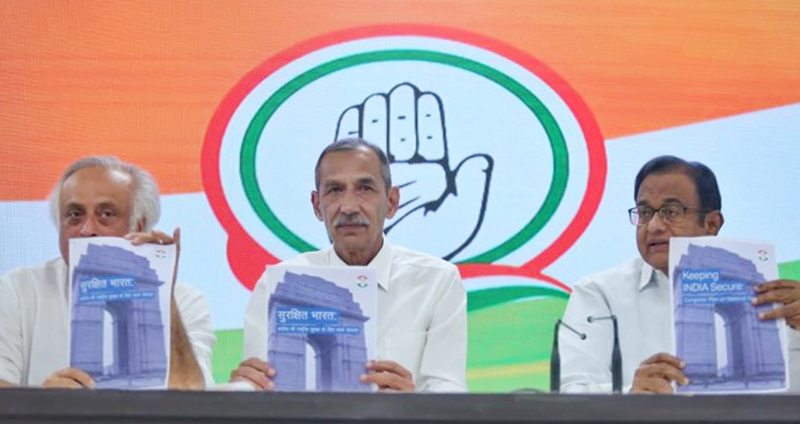Recommends new surrender policy, steps for countering radicalization
Says India must be prepared for limited military actions
Nishikant Khajuria
JAMMU, Apr 21: Stressing the need for holistically dealing with the continuing strife in Jammu and Kashmir, Congress party’s National Security Strategy document has called for a multi-pronged approach to tackle with the problem, which has transnational and internal dimensions.
A well thought-out surrender and rehabilitation policy, keeping contentious issues on the backburner, intra-State dialogue among the people of Jammu, Kashmir and Ladakh and serious efforts for countering radicalization are among the steps proposed in this much talked about document on India’s National Security Strategy, prepared by former GOC-in-C Northern Command, Lt Gen D S Hooda and submitted to Congress president Rahul Gandhi today.
Outlining approach with hostile Pakistan, which has been constantly supporting terror activities in the State, the document calls for sustained and long term strategy to build consistent diplomatic and economic pressure on the neighbouring country besides suggesting India to remain prepared for unilateral, limited military actions against terror group across the border.
Maintaining that immediate focus should be on bringing calm to the streets and reducing violence levels in Kashmir, the document says it is only after this that further steps can be taken for a long-term resolution to this difficult problem.
“The calm will come only if we deal with the people of J&K with empathy and understanding for which contentious issues that provide a trigger for more disturbances should currently be kept on the backburner, while attempts are made to arrive at a political consensus on these subjects,” read the document.
The Congress document says that a well-thought-out surrender and rehabilitation policy could be an effective step in reversing the growing trend of locals joining terror ranks. “The Government must attempt to replace uncertainty and fear with hope, which needs transparent, visible actions and an outreach to the people, in particular to the youth,” it explains while stating that perceptions and a fear of the future are key factors in triggering and sustaining conflict.
Further stating that killing terrorists is not the primary measure of success or conflict resolution, the document suggests that serious efforts are required for countering radicalization. “There is need to initiate structured programmes that bring together civil society members, family groups, educationists, religious teachers and even surrendered terrorists in an effort to roll back radicalization,” the document explains.
Stressing that healing must begin from within the State, the National Security Strategy document proposes that an intra-state dialogue among the people of Jammu, Kashmir and Ladakh is essential to bridge their difference. “The civil society must be encouraged to take the lead in this initiative,” says the document adding that the vexing problem of the displaced Kashmiri Pandit community must be squarely faced to find an honourable solution.
“There must be a clearly defined political objective that aims to mainstream Jammu and Kashmir with rest of India. This will set into motion an all of Government approach that synergises the actions of various Central and State agencies. This will also provide clear guidelines for the security forces to formulate their military strategy and define matrics for realistically gauging success. This will bring in much-needed consistency in holistically dealing with the problem,” read the document.
With regard to Pakistan, even as the Congress party document calls for long term strategy to build consistent diplomatic and economic pressure besides suggesting India to remain prepared for limited military actions against terror group across the border, it further maintains that dialogue with the neighbouring country must not be ruled out.
“However, talks with Pakistan must be structured and further progress must be based on visible results. Confidence building measures cannot be pursued if there is daily flare-up on the borders and infiltration continues,” says the document further suggesting that both the countries must also seriously engage on nuclear issue.
Besides other internal issues like Left wing extremism, North-East, transnational terrorism, the voluminous National Security Strategy document also deals with engaging China and other countries, including world powers. The report discusses India’s National Security Strategy aimed at achieving five objectives – “India’s rightful place in global affairs, ensuring a secure neighbourhood, peaceful resolution of internal conflict, protecting people and strengthening capabilities”.
Meanwhile, Lt General D S Hooda, who has prepared the documents and had supervised India’s military operations across the LoC in PoK against multiple terror launch pads there in September 2016, today said a single surgical or air strike is not enough to make Pakistan change its behaviour. Presenting salient features of his report during a press conference, the former Army General said “one surgical strike or air strike is not going to change Pakistan’s behaviour.”
Former Union Home Minister and senior Congress leader P Chidambaram, who was also present in the press conference, said India must also change its attitude towards Pakistan to bring about a change in its neighbour’s behaviour. He added that a way must be found to normalise the India-Pakistan relations so as to answer the country’s “biggest external challenge” in terms of security and various other aspects. Former Union Minister Jairam Ramesh was also present at the press conference.


